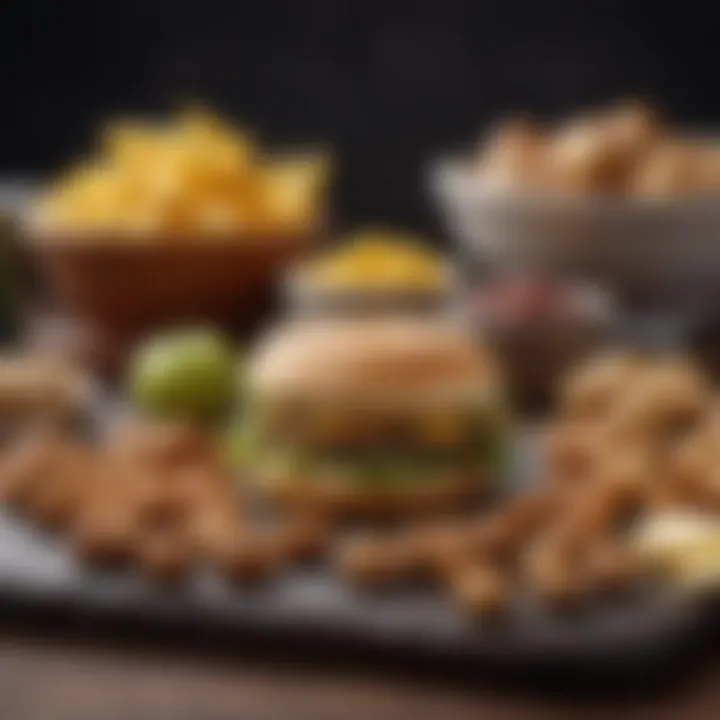Dietary Considerations for Gallstones: Foods to Avoid


Summary of Objectives
This article aims to explore the dietary implications for individuals diagnosed with gallstones. It emphasizes the specific foods and food groups that might aggravate symptoms or promote the formation of new stones. We aim to dissect the physiological effects of various nutrients and demonstrate the necessity of dietary management in preventing future complications associated with gallstones.
Importance of the Research
Understanding dietary considerations for gallstone management is crucial. Many people overlook the role that certain foods can play in exacerbating their condition. This research elucidates the relationship between diet and gallstone health, potentially guiding individuals toward better food choices.
Intro
Gallstones are a common condition that affects many individuals, particularly those with risk factors such as obesity, pregnancy, or certain dietary habits. Grasping the significance of dietary choices is fundamental for those affected. This article will delve into the various foods to avoid, supporting the premise that informed decisions can have a profound impact on gallstone symptoms and complications.
Change in diet is often necessary for managing health issues. Those suffering from gallstones can benefit from understanding how specific items can influence their condition. When specific foods are consumed, they may aggravate symptoms or contribute to new stone formation.
Results and Discussion
Presentation of Findings
In reviewing various studies and anecdotal evidence, several food categories stand out as particularly detrimental for those with gallstones. These include:
- High-fat Foods: These can strain the gallbladder and exacerbate symptoms. Fried foods and fatty cuts of meat are often culprits.
- Processed Foods: Items with high sugar and trans fats can lead to weight gain, a significant risk factor for gallstone development.
- Dairy Products: Full-fat dairy can increase cholesterol levels, contributing to stone formation.
- Refined Grains: White bread and pastries may lead to rapid spikes in blood sugar and fat, impacting gallbladder health.
Implications of Results
The implications of this research underscore the importance of a well-managed diet for preventing further complications. By avoiding specific foods, individuals may reduce symptoms and the likelihood of new stones forming. This is an essential step in fostering holistic gallbladder health.
Promoting awareness about dietary management strategies can empower individuals. Such knowledge invites better choices, improving health outcomes and quality of life.
"Dietary choices have a direct impact on gallbladder health. Understanding what to avoid can significantly enhance well-being."
In summary, thoughtful dietary management is essential for anyone diagnosed with gallstones. By navigating the complexities of what to include and exclude, individuals can take proactive steps toward managing their health.
Understanding Gallstones and Their Formation
Understanding gallstones is crucial for individuals who have been diagnosed with this condition. This knowledge serves as a foundation for making informed dietary choices that can alleviate symptoms and prevent new stone formations. Several elements make it necessary to delve into the formation of gallstones.
Firstly, a clear comprehension of what gallstones are allows patients to relate their symptoms and experiences more effectively. It also helps facilitate conversations with healthcare professionals. Secondly, knowing the types of gallstones aids in tailoring specific dietary restrictions, thus creating a more practical approach to diet management.
Additionally, identifying causes and risk factors associated with gallstone formation can help individuals recognize their vulnerabilities, making it easier to implement preventive measures. By understanding the symptoms and potential complications, one can develop effective strategies to mitigate their impact through proper dietary adjustments.
In summary, comprehending gallstones and their formation is essential in navigating the complexities of dietary management. By engaging with this topic, individuals can cultivate a proactive stance in their health journey and enjoy better gallbladder wellness.
Definition and Types of Gallstones
Gallstones are hardened deposits that can form in the gallbladder, an organ that plays a vital role in digestion. There are generally two main types of gallstones: cholesterol gallstones and pigment gallstones.
Cholesterol gallstones are the most common, typically appearing as yellowish formations. They occur when there is an excess of cholesterol in bile that the liver produces. In contrast, pigment gallstones are smaller and darker, forming from bilirubin, a substance produced from the breakdown of red blood cells. Understanding these types aids in recognizing the underlying issues that contribute to gallstone formation and can guide dietary choices.
Causes and Risk Factors
Several factors contribute to the formation of gallstones. A high-fat diet and low-fiber intake are significant causes of cholesterol gallstones. Other causes include obesity, diabetes, liver diseases, pregnancy, and rapid weight loss. Certain demographics are more susceptible, such as women, especially during reproductive years. Age also plays a role since the likelihood of gallstones increases with age.
Recognizing these risk factors allows individuals to make informed choices about their diet and overall lifestyle. By reducing consumption of high-risk foods, individuals can lower their chances of gallstone formation.
Symptoms and Complications
Symptoms of gallstones can vary widely. Common symptoms include abdominal pain, especially in the right upper quadrant, nausea, vomiting, and indigestion. Some individuals may also experience jaundice if a stone obstructs the bile duct.


Complications can arise from gallstones, such as inflammation of the gallbladder, pancreatitis, or bile duct infection. These complications can be seriously debilitating and necessitate urgent medical intervention. By understanding the symptoms and potential consequences, patients can take proactive measures to manage their condition effectively.
The Role of Diet in Gallstone Management
Diet plays a crucial role in managing gallstones. The right food choices can reduce discomfort and prevent new stones from forming. Understanding how different foods affect gallbladder health is essential for individuals dealing with gallstones. This topic becomes especially relevant for those seeking ways to mitigate symptoms and enhance overall well-being.
Adjusting one's diet focuses on long-term health benefits. Proper nutrition can improve gallbladder function and regulate bile production. Inadequate dietary habits can lead to gallbladder issues, which can exacerbate existing conditions.
Dietary management helps in controlling symptoms like pain and indigestion. It also provides guidance for incorporating healthier food choices into daily meals. Focusing on nutrient-dense foods supports both digestive health and gallbladder recovery. In the following sections, specific nutritional guidelines and the gallbladder’s function will be discussed to provide a comprehensive view of dietary considerations for individuals with gallstones.
Nutritional Guidelines for Gallbladder Health
Eating a well-rounded diet benefits gallbladder health significantly. Here are some key nutritional guidelines:
- High Fiber Intake: Including fruits and vegetables can aid in digestion. Fiber helps in moving bile and reduces the risk of stone development.
- Healthy Fats: Opt for healthy fats such as those found in avocados, nuts, and olive oil. These fats are easier for the body to process and can help promote gallbladder function.
- Lean Proteins: Foods such as chicken breast, fish, and plant-based proteins provide essential nutrients while being lower in unhealthy fats.
- Stay Hydrated: Drinking enough water is fundamental for maintaining proper bile flow, reducing the potential for stone formation.
Balanced meals based on these principles can contribute to better health outcomes for those with gallstones.
Understanding the Gallbladder's Function
The gallbladder is a small organ that plays a pivotal role in digestion. Here is an overview of its function:
- Bile Storage: The gallbladder stores bile produced by the liver. This bile is critical for digesting fats.
- Bile Release: When food, especially fatty foods, enters the small intestine, the gallbladder releases bile to aid in digestion.
- Fat Emulsification: Bile acids emulsify fats, allowing enzymes to break them down effectively.
An understanding of the gallbladder's role in digestion highlights the importance of dietary choices. When dietary fat intake is inappropriate, it can lead to gallbladder dysfunction. Individuals with gallstones must be cautious about their dietary habits to ensure effective digestion and to prevent complications.
Maintaining excellent gallbladder health requires vigilance in dietary choices and habits.
Foods to Avoid with Gallstones
Diet plays a crucial role for individuals with gallstones. It can help prevent complications and reduce discomfort. Certain foods have been linked to gallstone formation or can trigger symptoms. Understanding these foods is essential for effective dietary management. Awareness can lead to better lifestyle choices and improved gallbladder health.
High-Fat Foods
High-fat foods are particularly problematic for those with gallstones. These types of foods can trigger the gallbladder to release bile more frequently. This is because the gallbladder's main function is to store bile, which helps in digesting fats. If fat intake is high, it can lead to an overproduction of bile, contributing to gallstone symptoms. Foods high in saturated fats, such as butter, lard, and fatty cuts of meat, should be limited. Instead, healthier fat sources, like avocados and legumes, should be considered in moderation.
Fried and Processed Foods
Fried and processed foods are another category to avoid. These foods are often high in unhealthy fats and sugars. They can create an environment where gallstones thrive. Processed snacks, like chips and fast food items, contain little nutritional value but are loaded with trans fats.
Regular consumption of fried items can also affect overall digestive health. Reducing these items in daily meals can significantly lower the risk of gallstone flare-ups.
Refined Carbohydrates and Sugars
Refined carbohydrates and sugars can lead to increased insulin levels. Higher insulin can stimulate the liver to produce more cholesterol, which is a component of gallstones. Foods like white bread, pastries, and sugary drinks should be avoided. Whole grains can provide fiber and other nutrients without the adverse effects of their refined counterparts. It is important to focus on complex carbohydrates, which can help maintain steady blood sugar levels.
Certain Dairy Products
The type of dairy consumed can also make a difference. Whole milk and high-fat dairy products may exacerbate symptoms. Some individuals find that full-fat cheese or cream leads to discomfort. Low-fat or non-fat dairy options are better choices for those managing gallstones. These can provide necessary calcium without the additional fat content that may harm gallbladder function.
Red and Processed Meats
Red and processed meats are often high in saturated fats and cholesterol. Eating these meats can contribute to gallstone formation. Classes of meats such as bacon, sausages, and fatty cuts of beef should be limited. Lean protein sources, like chicken or fish, are more suitable alternatives that can satisfy protein needs without the added gallstone risks.
"Awareness of dietary choices is vital for those managing gallstones. Adjusting food intake can lead to better health outcomes."
Understanding Trigger Foods
Understanding the concept of trigger foods is crucial for individuals managing gallstones. Not all foods affect everyone in the same way, which makes identifying specific triggers vital. These foods can provoke symptoms in some people while remaining harmless to others.


Recognizing and managing these unique dietary triggers may help prevent painful episodes associated with gallstones. When a gallbladder is not functioning optimally, certain foods can lead to increased bile production, resulting in discomfort or complications.
Identifying Personal Triggers
Identifying your personal food triggers requires careful observation and a methodical approach. One effective way to do this is by maintaining a food diary. This diary should include everything consumed throughout the day, paired with notes on symptoms experienced after meals. Over time, patterns may emerge.
Consider factors such as:
- Timing of symptoms after food consumption
- Specific combinations of foods that seem problematic
- Portion sizes and how they relate to symptoms
It is important to be aware that trigger foods can differ significantly among individuals. What causes issues for one person may be tolerable for another. It can be beneficial to work with a healthcare professional to systematically find and eliminate triggers from the diet.
Food Intolerances and Their Impact
Food intolerances often play a role in the symptoms experienced by individuals with gallstones. Unlike food allergies, which can trigger immediate immune responses, intolerances tend to lead to delayed reactions. Symptoms might include bloating, gas, abdominal pain, or changes in bowel habits.
Common intolerances related to gallbladder health include:
- Lactose intolerance, affecting how dairy is digested
- Gluten intolerance, impacting the absorption of certain nutrients
When these intolerances are not addressed, they can compound the problems associated with gallstones. An individual might experience exacerbated symptoms in response to both gallstones and food intolerances.
In summary, understanding trigger foods and their effects on the body provides individuals with gallstones a roadmap to managing their diet. Through methods like keeping a food diary and being vigilant about food intolerances, individuals can take proactive steps toward smoother digestion and a healthier gallbladder.
Nutritional Alternatives to Consider
Choosing appropriate foods is crucial for managing gallstones. By replacing problematic items with more suitable nutritional alternatives, individuals can enhance gallbladder health and mitigate the risk of complications. This section outlines such alternatives, emphasizing their role in a balanced diet for those affected by gallstones. Incorporating these options contributes to better symptom management and overall wellbeing.
Healthy Fats to Incorporate
Unlike saturated fats, which can increase the risk of gallstone formation, certain healthy fats may actually offer benefits. Fats from sources like avocados, nuts, and olive oil are better options. These fats help in fat digestion and contribute to stability in the gallbladder.
- Avocados are rich in monounsaturated fats, promoting gallbladder function.
- Nuts, particularly walnuts and almonds, offer omega-3 fatty acids, known for their anti-inflammatory properties.
- Olive oil supports the digestive system and can aid in reducing cholesterol, a component of some gallstones.
Incorporating these fats into meals can also enhance satiety, helping control overall food intake.
Sources of Fiber
Fiber plays a significant role in digestion and cholesterol regulation. Including high-fiber foods in the diet can prevent the formation of gallstones. Options include:
- Fruits such as apples, pears, and berries provide soluble fiber, which has been shown to reduce cholesterol levels.
- Vegetables like broccoli, kale, and Brussels sprouts are also high in fiber and support digestive health.
- Whole grains, such as brown rice and whole wheat bread, can replace refined grains in the diet, promoting better digestive function.
Adequate fiber intake helps with digestion and lowers the risk of gallstone formation, making it a valuable dietary consideration.
Lean Protein Sources
Choosing lean proteins is vital for managing health while avoiding high-fat meats that can exacerbate gallstone issues. Recommended lean protein sources include:
- Fish such as salmon and trout, which are high in omega-3 fatty acids and lower in saturated fat.
- Poultry like chicken or turkey, preferably skinless to reduce fat intake.
- Legumes such as lentils, beans, and chickpeas, which provide protein without the added fat.
These alternatives can help supply necessary protein while maintaining a healthier overall diet.
"Opting for these lean protein sources not only supports gallbladder health but also contributes to a balanced diet essential for overall wellbeing."
Lifestyle Modifications for Gallstone Prevention
Making effective lifestyle changes plays a crucial role in preventing the formation of gallstones and managing existing conditions. These modifications can minimize symptoms, enhance gallbladder function, and improve overall health. Adopting healthy habits is a proactive approach to managing gallstone risk effectively.


Importance of Regular Physical Activity
Regular physical activity has a significant impact on gallstone prevention. Engaging in physical exercises helps maintain a healthy weight and regulates cholesterol levels, both of which are critical factors in reducing gallstone risk. Excess weight, particularly abdominal obesity, has been associated with higher incidence of gallstones. By integrating more physical activity into your routine, you can lower these risks.
Aerobic activities are particularly valuable for gallbladder health. Brisk walking, swimming, or cycling can improve cholesterol metabolism and stimulate healthy bile flow. Aim for at least 150 minutes of moderate-intensity exercise weekly.
- Aerobic Exercise: Improve bile flow and cholesterol levels.
- Strength Training: Help maintain a healthy weight.
- Flexibility Exercises: Provide overall body benefits.
Incorporating physical activity doesn’t have to be overwhelming. Start small and gradually increase intensity. Even simple tasks like walking can be effective and beneficial.
Staying Hydrated
Hydration plays an important role in gallbladder health. Water consumption aids in the digestion process and helps to keep bile fluid. Impaired bile consistency can lead to the formation of gallstones. Drinking adequate amounts of water helps to dilute bile, making it less concentrated and less likely to form stones.
On average, aim for eight glasses of fluids each day, primarily water. Monitoring fluid intake can help ensure that the body stays hydrated, especially during hot weather or physical activities.
“Water is essential for all bodily functions including digestion and bile production."
In addition to plain water, herbal teas and low-sugar fruit juices can contribute to hydration, but try to avoid caffeinated and sugary beverages that can lead to dehydration.
Here are some tips for maintaining proper hydration:
- Carry a water bottle to ensure easy access.
- Set reminders to drink at regular intervals.
- Include foods high in water content, like fruits and vegetables, in your diet.
Monitoring and Evaluating Dietary Changes
Monitoring and evaluating dietary changes is essential for those with gallstones. This process helps individuals understand how their food choices affect their health. Keeping track of what one eats allows for identification of how certain foods may trigger symptoms. It becomes a crucial strategy in managing gallstone-related issues.
Regular assessment of one’s diet can provide several benefits. First, it enhances awareness about food triggers. When individuals notice patterns between what they eat and their symptoms, they can make informed adjustments. This tailored approach may reduce the likelihood of gallstone exacerbation.
Moreover, evaluating dietary changes provides motivation. Observing positive trends, such as improved digestion or reduced discomfort, encourages individuals to maintain healthier habits. Conversely, recognizing less favorable outcomes can prompt immediate changes, avoiding long-term complications.
Individuals should also consider adjusting their meals based on health feedback. This includes not only physical responses but also how certain foods affect overall well-being.
"Tracking dietary habits offers insights that may lead to better health outcomes and quality of life for individuals managing gallstones."
Aside from personal monitoring, the involvement of healthcare professionals ensures a more comprehensive understanding of dietary impacts. This collective approach can guide individuals toward optimal dietary practices.
Keeping a Food Diary
Keeping a food diary plays a vital role in dietary management for individuals with gallstones. A food diary allows one to record daily food intake and any associated symptoms. This practice brings clarity about personal triggers and patterns in one's diet.
To begin with, it is important to be consistent. Recording meals, snacks, and beverages consumed during the day provides a comprehensive view of dietary habits. Include details such as portion sizes and times meals are consumed. Over time, reviewing this diary can reveal correlations between specific foods and gallstone symptoms.
In addition to symptom tracking, a food diary can be an educational tool. Individuals may learn more about which foods are beneficial and which ought to be avoided. For example, noting adverse reactions after eating high-fat foods reinforces the need to limit those items.
Overall, maintaining a food diary fosters accountability. It encourages a proactive approach to dietary choices. This practice supports the journey toward improved gallbladder health and symptom management.
Consulting Healthcare Professionals
Consulting healthcare professionals is an important step in monitoring dietary changes. Professionals can provide tailored advice based on individual medical histories and health goals. This guidance is particularly valuable for those dealing with gallstones.
Experts such as dietitians or gastroenterologists can help interpret the data collected in a food diary. They can identify nutrient deficiencies or excesses and recommend dietary adjustments tailored to one's individual needs. For instance, they might suggest alternatives that provide essential nutrients without triggering gallstone-related symptoms.
Furthermore, consulting with healthcare professionals promotes a well-rounded approach to health. Professionals consider various factors like lifestyle, age, and existing conditions. This comprehensive examination can lead to more effective dietary strategies.
In summary, engaging with healthcare professionals ensures that dietary changes align with overall health objectives. Their expert input not only enhances individual understanding but also increases the likelihood of successful management of gallstones.
Finale
Understanding the dietary considerations for individuals with gallstones is paramount for effective management and prevention of complications. This article emphasizes the necessity of recognizing specific foods that can trigger symptoms or contribute to the formation of gallstones. Adopting a diet aligned with gallbladder health is not merely about restriction; it involves making informed choices that promote overall well-being.
After exploring the various foods to avoid, such as high-fat items and processed options, one can appreciate the intricate relationship between diet and gallbladder function. Moreover, recognizing individual trigger foods and incorporating suitable replacements are crucial steps in managing one's health. Keeping a food diary, in conjunction with advice from healthcare professionals, is beneficial for tracking dietary impacts and making necessary adjustments.
The significance of this topic extends beyond just symptom management. It encompasses the profound effects of daily food choices on long-term health. By understanding and implementing these dietary guidelines, individuals with gallstones can reduce discomfort and enhance their gallbladder health.















